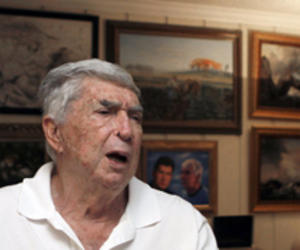U.S. rests its case in ex-CIA agent Posada's trial
- Submitted by: manso
- Politics and Government
- 03 / 25 / 2011

BY ALFONSO CHARDY.ElNuevoHerald.com. EL PASO, Texas -- The prosecution rested its case Thursday in the Luis Posada Carriles perjury trial after 11 weeks and 23 witnesses.
“The United States has concluded its case in chief and, at least for now, the government rests,’’ lead prosecutor T. J. Reardon III told the jury and U.S. District Judge Kathleen Cardone, the federal judge presiding over the case.
Prosecution witnesses included a former New York Times reporter, Ann Louise Bardach, who said the Cuban exile militant claimed credit for bombings in Cuba in 1997 and two Cuban government officials – Lt. Col. Roberto Hernandez Caballero and Dr. Ileana Vizcaino Dime — who described the bombings and the autopsy of the sole fatal victim, Italian tourist Fabio Di Celmo.
Another key prosecution witness was a former crew member of the converted shrimper Santrina, Gilberto Abascal, who said Posada sneaked into the United States aboard the boat in 2005.
The witnesses’ statements during trial are central to the federal government’s case against Posada who was indicted for lying about his alleged role in the 1997 Cuban bombings, how he entered the country in 2005 and how he came to posses a Guatemalan passport bearing his photograph and another name.
Posada told U.S. immigration officials that he did not arrange for anyone to plant the bombs at Cuban tourist sites and insisted that he entered the United States across the Mexican border, assisted by a migrant smuggler. He also denied having had a Guatemalan passport under somebody else’s name.
Posada is not charged with the bombings, but with lying to U.S. immigration officials about his alleged role in the bombings.
Now the trial moves into the final phase, with the defense putting on its case to persuade the jury to disregard the government’s allegations as unfounded and acquit Posada.
Precisely how Posada’s lead defense attorney, Arturo V. Hernandez, intends to sway the jury is unclear. Hernandez declined to comment.
However, it was expected that the defense will call 10 witnesses to discredit the government’s witnesses and its evidence.
Hernandez is also expected to present jurors with a version of events from Posada’s perspective.
For example, Hernandez has indicated in prior court statements that the bombs in Cuba might have been planted by Cuban government agents to falsely implicate Posada and Cuban exiles in the United States.
And in his opening statements and subsequent statements in court, Hernandez also indicated that he would try to sway jurors by portraying government witnesses as either unreliable or biased against his client.
Source: //www.miamiherald.com/2011/03/24/2131922/us-rests-its-case-in-posada-trial.html
Comments